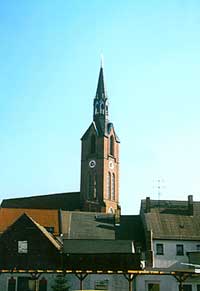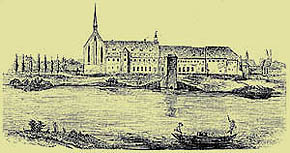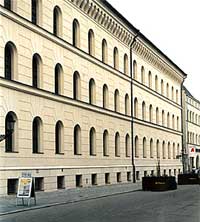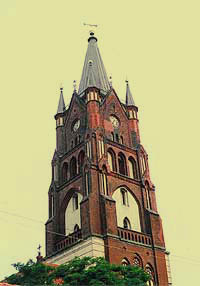The life of Paul Gerhardt
Gräfenhainichen 1607-1622
 Paul Gerhardt’s place of birth, Gräfenhainichen, was an agricultural city in Saxony-Anhalt and belonged to the Earl of Meißen in the early 17th century. Up until the Thirty Years War, the city had around 1000 inhabitants.
The city was surrounded by a wall and could be entered through the Eastern and Western Gates.
Gräfenhainichen was governed by three mayors, one of whom was PG’s father, Christian Gerhardt. The job of mayor rotated each year between the three mayors: one held the office of mayor while the other two acted as counselors.
Paul Gerhardt was born on March 12, 1607. His mother was from Eilenburg and was the daughter of superintendent Starke. PG’s father was a farmer, mayor and pub owner in Gräfenheinichen. Very early on, PG and his three siblings (a brother and two sisters) lost their parents. His father died when he was 12 years old and his mother only one year later.
Paul Gerhardt attended school in Gräfenhainichen until 1622. There he was instructed in the subjects of religion, singing, reading, writing, and Latin. During this time he became familiar with religious songs. It was usual for the pupils to sing the liturgy during the worship service.
Paul Gerhardt’s place of birth, Gräfenhainichen, was an agricultural city in Saxony-Anhalt and belonged to the Earl of Meißen in the early 17th century. Up until the Thirty Years War, the city had around 1000 inhabitants.
The city was surrounded by a wall and could be entered through the Eastern and Western Gates.
Gräfenhainichen was governed by three mayors, one of whom was PG’s father, Christian Gerhardt. The job of mayor rotated each year between the three mayors: one held the office of mayor while the other two acted as counselors.
Paul Gerhardt was born on March 12, 1607. His mother was from Eilenburg and was the daughter of superintendent Starke. PG’s father was a farmer, mayor and pub owner in Gräfenheinichen. Very early on, PG and his three siblings (a brother and two sisters) lost their parents. His father died when he was 12 years old and his mother only one year later.
Paul Gerhardt attended school in Gräfenhainichen until 1622. There he was instructed in the subjects of religion, singing, reading, writing, and Latin. During this time he became familiar with religious songs. It was usual for the pupils to sing the liturgy during the worship service. Sovereign's School in Grimma 1622-1627
 The Royal Academy St. Augustin, a former monastery, was the school of future clerks and clericals. Prince Moritz of Saxony-Meißen founded this school in 1550. The subjects taught were religion, grammar, logic, music, the rules of poetry, ancient languages (Greek and Latin) and rhetoric. The first director, Adam Silber, a pupil of Melanchthon, had shaped the curriculum through the publication of his textbooks.
The educational system was based on the memorization of traditional texts and their translation. In addition to this, much attention was given to musical education. During lessons in music, liturgical verses were studied for the worship service, as well as choral arrangements by Orlando di Lasso, Adam Gumpelsheimer and others. The most important goal of education was to foster belief in God and trust in the „right faith“.
The daily life of the pupils was regulated as in a monastery. The pupils slept in the former monastery’s unheated cells. At 5 AM the pupils were woken up and at 8 PM they had to go to their cells. During the course of the day, educational lessons alternated with time for praying, as well as self-study.
Paul Gerhardt attended this school with his older brother, Christian, who had begun attending one year earlier. The strict school system did not suit Christian. Once he even ran away and ended up leaving the school prematurely.
In the school annual of 1625, there is an evaluation in Latin regarding PG. It says that he does have talent and that he shows diligence and obedience. His written compositions and his poems were noted as „tolerable“.
The Royal Academy St. Augustin, a former monastery, was the school of future clerks and clericals. Prince Moritz of Saxony-Meißen founded this school in 1550. The subjects taught were religion, grammar, logic, music, the rules of poetry, ancient languages (Greek and Latin) and rhetoric. The first director, Adam Silber, a pupil of Melanchthon, had shaped the curriculum through the publication of his textbooks.
The educational system was based on the memorization of traditional texts and their translation. In addition to this, much attention was given to musical education. During lessons in music, liturgical verses were studied for the worship service, as well as choral arrangements by Orlando di Lasso, Adam Gumpelsheimer and others. The most important goal of education was to foster belief in God and trust in the „right faith“.
The daily life of the pupils was regulated as in a monastery. The pupils slept in the former monastery’s unheated cells. At 5 AM the pupils were woken up and at 8 PM they had to go to their cells. During the course of the day, educational lessons alternated with time for praying, as well as self-study.
Paul Gerhardt attended this school with his older brother, Christian, who had begun attending one year earlier. The strict school system did not suit Christian. Once he even ran away and ended up leaving the school prematurely.
In the school annual of 1625, there is an evaluation in Latin regarding PG. It says that he does have talent and that he shows diligence and obedience. His written compositions and his poems were noted as „tolerable“. Student of Theology 1628-1642
 It was the time of the Thirty Years War. King Gustav Adolf of Sweden did not harm Wittenberg, the birthplace of the Reformation. Gräfenhainichen, however, PG’s hometown, was destroyed in the war, as was his parents‘ house. In the 16th and 17th centuries the University of Wittenberg was a well-known center for humanities in Europe, especially for Lutheran theology. In the study of theology much attention was paid to polemics, dogmatics, rhetoric, and politics.
On January 2, 1628, PG enrolled at this university. Throughout his studies his work as a poet was strongly influenced by the professors
Buchner and Röber. Both have earned special merits for the German language.
Paul Gerhardt stayed in Wittenberg for almost 14 years and earned his living as a house teacher after completing his studies.
During the years of the war it was difficult for pastors to find positions. Most of the villages and cities were very poor and could not afford a pastor.
It was the time of the Thirty Years War. King Gustav Adolf of Sweden did not harm Wittenberg, the birthplace of the Reformation. Gräfenhainichen, however, PG’s hometown, was destroyed in the war, as was his parents‘ house. In the 16th and 17th centuries the University of Wittenberg was a well-known center for humanities in Europe, especially for Lutheran theology. In the study of theology much attention was paid to polemics, dogmatics, rhetoric, and politics.
On January 2, 1628, PG enrolled at this university. Throughout his studies his work as a poet was strongly influenced by the professors
Buchner and Röber. Both have earned special merits for the German language.
Paul Gerhardt stayed in Wittenberg for almost 14 years and earned his living as a house teacher after completing his studies.
During the years of the war it was difficult for pastors to find positions. Most of the villages and cities were very poor and could not afford a pastor. Houseteacher in Berlin 1643-1651
 In Berlin the number of inhabitants had also declined considerably as a result of the Thirty Years War. The country was destroyed and economically ruined. Elector Friedrich Wilhelm tried to unify Brandenburg and Prussia into one country. He was annoyed by the fights between Lutherans and the Reformed. He demanded mutual tolerance from them both.
In Berlin Paul Gerhardt became the house teacher for the family of the court advocate Andreas Berthold. During this time he wrote many song texts, which were arranged by Johann Crüger, cantor at the Nikolai Church in Berlin. Crüger published them in his hymnal „Praxis Pietatis Melica“. In 1647 it already contained 18 songs written by Paul Gerhardt.
In Berlin the number of inhabitants had also declined considerably as a result of the Thirty Years War. The country was destroyed and economically ruined. Elector Friedrich Wilhelm tried to unify Brandenburg and Prussia into one country. He was annoyed by the fights between Lutherans and the Reformed. He demanded mutual tolerance from them both.
In Berlin Paul Gerhardt became the house teacher for the family of the court advocate Andreas Berthold. During this time he wrote many song texts, which were arranged by Johann Crüger, cantor at the Nikolai Church in Berlin. Crüger published them in his hymnal „Praxis Pietatis Melica“. In 1647 it already contained 18 songs written by Paul Gerhardt. Priest in Mittenwalde 1651-1657
 When PG came to Mittenwalde, this region was also devastated because of the fights between Swedish and German troops. By 1645 the number of inhabitants had decreased from 1000 to 250. After the pastor passed away, the magistrate of Mittenwalde decided to look for a successor for the vacant position. Thus, PG was invited to give a trial sermon on September 28, 1651, and was soon elected as the new pastor. PG was ordained on November 18, 1651, and confirmed in his new position.
Four years after he had begun preaching in Mittenwalde, he married Anna Maria Berthold.
One year later their daughter Maria Elisabeth was born, who died at the age of eight months. A stone in the Moritz church in Mittenwalde still stands as a memorial to her.
In his position, PG also supervised eleven clerical positions and the schools in the areas of Königs Wusterhausen, Gussow, Teupitz, Gräbendorf, Zossen, Ragow, Gallun, and Schenkendorf.
At the end of May 1657, PG received an invitation from the magistrate of the city of Berlin to become the second deacon of the Berlin Nikolai Church.
When PG came to Mittenwalde, this region was also devastated because of the fights between Swedish and German troops. By 1645 the number of inhabitants had decreased from 1000 to 250. After the pastor passed away, the magistrate of Mittenwalde decided to look for a successor for the vacant position. Thus, PG was invited to give a trial sermon on September 28, 1651, and was soon elected as the new pastor. PG was ordained on November 18, 1651, and confirmed in his new position.
Four years after he had begun preaching in Mittenwalde, he married Anna Maria Berthold.
One year later their daughter Maria Elisabeth was born, who died at the age of eight months. A stone in the Moritz church in Mittenwalde still stands as a memorial to her.
In his position, PG also supervised eleven clerical positions and the schools in the areas of Königs Wusterhausen, Gussow, Teupitz, Gräbendorf, Zossen, Ragow, Gallun, and Schenkendorf.
At the end of May 1657, PG received an invitation from the magistrate of the city of Berlin to become the second deacon of the Berlin Nikolai Church. Second Deacon at St. Nikolai in Berlin 1657-1669
 In 1643 Elector Friedrich Wilhelm moved his residence from Königsberg to Berlin. Although Friedrich Wilhelm had tried to keep the war away from Berlin by paying high amounts of money to the soldiers, Berlin was the victim of plagues, starvation, and misery as well. The pest, in particular, had killed many people. Many homes were empty.
Johann Crüger was cantor at the Nikolai church and had written the melodies to many of Paul Gerhardt’s hymn lyrics, which he had published in Praxis Pietas Melica. Johann Georg Ebeling, who succeeded Crüger after his death in 1662, maintained this tradition. He wrote the melodies for 120 of PG’s lyrics.
After 1666 PG became involved in a conflict. Elector Friedrich Wilhelm was interested in having peace between the different religions in his country. He himself and the royal household belonged to the Reformed Church. Therefore, he demanded tolerance from the Lutherans towards those of the Reformed. The main issue of debate was the difference in the theological conception of the sacraments.
However, for the Lutherans, the Reformed did not have „the right faith“.
The Elector ordered religious talks between the two groups in the hope that the Lutherans and Reformed would recognize their common beliefs. However, the opposite was the case and the issues of debate became more heated. Now the Elector demanded tolerance from the Lutheran by decree. Every Lutheran theologian now had to confirm with his signature that he would be tolerant of people of the other faith. Paul Gerhardt did not sign this order because of a conflict with his convictions. As a result, he was expelled from his position. Several times, the people of Berlin, as well as the magistrate, asked the Elector to allow him to remain in his position, but the Elector refused. Only when the rich farmers put pressure on him to reinstate Paul Gerhardt in his old position did the Elector agree. Although PG refused to sign the decree, the Elector told him that he expected him to be tolerant of other beliefs. Paul Gerhardt could not accept this and therefore resigned from his position.
But the conflict with the Great Elector was not the only problem facing Paul Gerhardt during this period. After three of his children had died, his wife Anna Maria passed away as well.
In 1643 Elector Friedrich Wilhelm moved his residence from Königsberg to Berlin. Although Friedrich Wilhelm had tried to keep the war away from Berlin by paying high amounts of money to the soldiers, Berlin was the victim of plagues, starvation, and misery as well. The pest, in particular, had killed many people. Many homes were empty.
Johann Crüger was cantor at the Nikolai church and had written the melodies to many of Paul Gerhardt’s hymn lyrics, which he had published in Praxis Pietas Melica. Johann Georg Ebeling, who succeeded Crüger after his death in 1662, maintained this tradition. He wrote the melodies for 120 of PG’s lyrics.
After 1666 PG became involved in a conflict. Elector Friedrich Wilhelm was interested in having peace between the different religions in his country. He himself and the royal household belonged to the Reformed Church. Therefore, he demanded tolerance from the Lutherans towards those of the Reformed. The main issue of debate was the difference in the theological conception of the sacraments.
However, for the Lutherans, the Reformed did not have „the right faith“.
The Elector ordered religious talks between the two groups in the hope that the Lutherans and Reformed would recognize their common beliefs. However, the opposite was the case and the issues of debate became more heated. Now the Elector demanded tolerance from the Lutheran by decree. Every Lutheran theologian now had to confirm with his signature that he would be tolerant of people of the other faith. Paul Gerhardt did not sign this order because of a conflict with his convictions. As a result, he was expelled from his position. Several times, the people of Berlin, as well as the magistrate, asked the Elector to allow him to remain in his position, but the Elector refused. Only when the rich farmers put pressure on him to reinstate Paul Gerhardt in his old position did the Elector agree. Although PG refused to sign the decree, the Elector told him that he expected him to be tolerant of other beliefs. Paul Gerhardt could not accept this and therefore resigned from his position.
But the conflict with the Great Elector was not the only problem facing Paul Gerhardt during this period. After three of his children had died, his wife Anna Maria passed away as well. Archdeacon at Luebben's Main Church 1669-1676
 Some Berlin friends of Paul Gerhardt had heard of a vacancy for a rectorate in the Saxony area of Lübben and brought Paul Gerhardt to the attention of the magistrate of the town.
On October 14, 1668, he was invited to give a sermon. Thereupon, the magistrate of Lübben appointed him archdeacon at the Main Church.
Until his final relocation to Lübben he travelled to Lübben on festive days on his duty to perform the sermons. Only on June 6, 1669, he was officially inaugurated. Together with his son Paul Friedrich, his sister-in-law Sabina Fromm and her son Andreas, he moved into the deacon’s residence in Church Street.
It is not known whether Paul Gerhardt wrote songs in Lübben. A sermon for a funeral, written by him and printed at that time, however, has been preserved.
His relationship to the magistrate was troubled by some „singularities“ (idiosyncrasies) of his. The magistrate got restless as Paul Gerhardt took his time to assume office in Lübben. However, the belated assumption of office was also partly the magistrate’s fault: he was offered inadequate living space which, in addition to that, was in a desolate state. The renovation of this apartment was progressing at a slow pace.
A cause for complaint about Paul Gerhardt was the fact that during his official duties he did not wear the usual priest’s cap, but a wig.
Some Berlin friends of Paul Gerhardt had heard of a vacancy for a rectorate in the Saxony area of Lübben and brought Paul Gerhardt to the attention of the magistrate of the town.
On October 14, 1668, he was invited to give a sermon. Thereupon, the magistrate of Lübben appointed him archdeacon at the Main Church.
Until his final relocation to Lübben he travelled to Lübben on festive days on his duty to perform the sermons. Only on June 6, 1669, he was officially inaugurated. Together with his son Paul Friedrich, his sister-in-law Sabina Fromm and her son Andreas, he moved into the deacon’s residence in Church Street.
It is not known whether Paul Gerhardt wrote songs in Lübben. A sermon for a funeral, written by him and printed at that time, however, has been preserved.
His relationship to the magistrate was troubled by some „singularities“ (idiosyncrasies) of his. The magistrate got restless as Paul Gerhardt took his time to assume office in Lübben. However, the belated assumption of office was also partly the magistrate’s fault: he was offered inadequate living space which, in addition to that, was in a desolate state. The renovation of this apartment was progressing at a slow pace.
A cause for complaint about Paul Gerhardt was the fact that during his official duties he did not wear the usual priest’s cap, but a wig.
 The people of Lübben deemed this too worldly. They also forbade him to source his beer from Torgau. The town highlighted its own brewing privilege: this privilege banned the import of beer. Another offence was taken when he dropped the „Wednesday Sermon“ before festive days. As a consequence the city fathers even complained to their sovereign, Christian of Saxony-Merseburg.
Just before his death, he made his last will and testament to his son Paul Friedrich. It is an unusual last will as it consists of behavioural guidelines. Paul Friedrich Gerhardt later left this last will including all song lyrics of his father to superintendent Feustking in Zerbst. Paul Gerhardt’s songs were published in a song book by Mr. Feustking with the last will printed within the preface – through this it was possible for it to be passed down to us.
Paul Gerhardt died on May 27, 1676, and was laid to rest on June 7 in the chancel of Lübben’s Main Church. The exact location however is not known.
In 1907, in commemoration of his 300th birthday, the city of Lübben honoured Paul Gerhardt by erecting a monument in front of the church. Also, renaming Lübben’s Main Church, having undergone extensive renovation beforehand, into „Paul-Gerhardt-Church“ in 1931 was another way of honouring the composer by the people of Lübben.
The people of Lübben deemed this too worldly. They also forbade him to source his beer from Torgau. The town highlighted its own brewing privilege: this privilege banned the import of beer. Another offence was taken when he dropped the „Wednesday Sermon“ before festive days. As a consequence the city fathers even complained to their sovereign, Christian of Saxony-Merseburg.
Just before his death, he made his last will and testament to his son Paul Friedrich. It is an unusual last will as it consists of behavioural guidelines. Paul Friedrich Gerhardt later left this last will including all song lyrics of his father to superintendent Feustking in Zerbst. Paul Gerhardt’s songs were published in a song book by Mr. Feustking with the last will printed within the preface – through this it was possible for it to be passed down to us.
Paul Gerhardt died on May 27, 1676, and was laid to rest on June 7 in the chancel of Lübben’s Main Church. The exact location however is not known.
In 1907, in commemoration of his 300th birthday, the city of Lübben honoured Paul Gerhardt by erecting a monument in front of the church. Also, renaming Lübben’s Main Church, having undergone extensive renovation beforehand, into „Paul-Gerhardt-Church“ in 1931 was another way of honouring the composer by the people of Lübben.